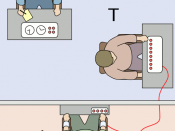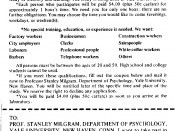To what extent can findings from obedience research be applied beyond the research setting?
Obedience can be defined as complying with the wishes of an authortive figure, thus limiting their levels of responsibility. This can be shown on many levels, from something as everyday as a child obeying it's parents, to more shocking levels of obedience, such as the horrific destruction of millions of Jews in the Second World War.
It had been said after the Second World War that Germans have a basic character defect, which allowed them to obey the demands of Hitler when he was at his most powerful. This was called the Fascism Scale (F Scale), and said that obedience was abnormal. It was to do with a person's disposition, to whether they would be obedient or not. A psychologist called Milgram (1974) set out to prove this theory wrong, using one of the most controversial experiments in the last fifty years, where a participant was required to believe that he had 'killed' another living person.
Advertisements were made in a local newspaper, which asked for volunteers for a memory experiment, which would take place at Yale University, it would take about an hour, and there would be a payment of $4.50 for the participant's time. The advertisement called for people from all areas of life. From Factory workers to Businessmen, and Salespeople to Professional people.
When the subjects arrived at the University, a man, who introduced himself as Jack Williams, the experimenter, greeted them. Also present was a Mr Wallace, who was supposedly another participant in the experiment. Mr Wallace was actually an assistant of Milgram. Everything after the real participant's arrival was carefully planned and scripted.
The subject and Mr Wallace were told that the experiment was to test the effects of punishment...



:-)
good and to the point
4 out of 4 people found this comment useful.